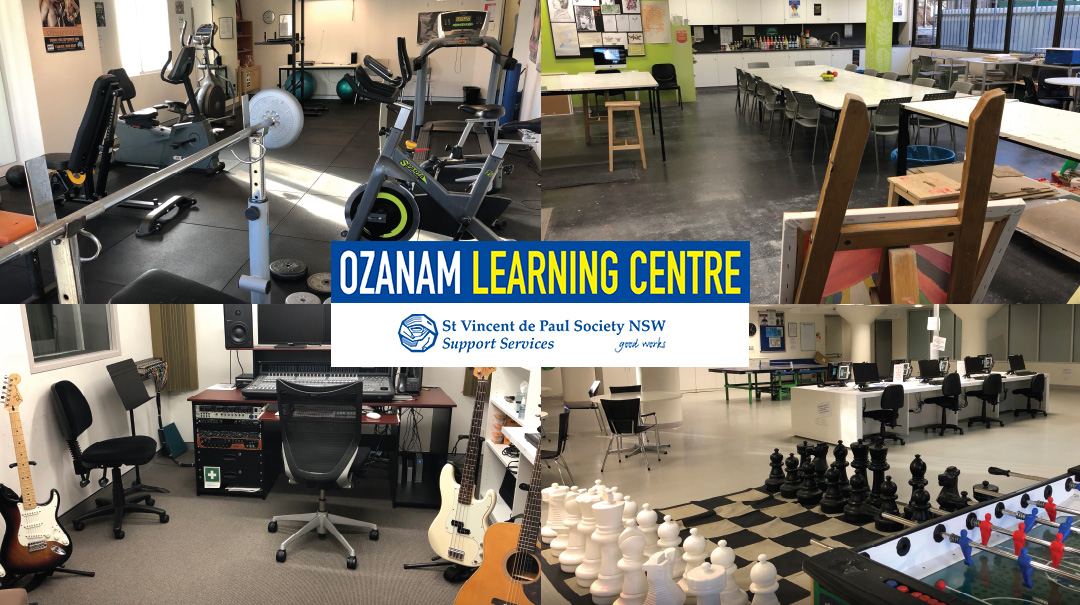A hub for the locals: The Ozanam Learning Centre


A short walk from the waterfront, down a quiet street in Woolloomooloo, sits a hub of activity. With classes spanning from drumming to tai-chi and access to pool tables, a kitchen and even a recording studio, there is something on every day at the Ozanam Learning Centre, run by the St Vincent de Paul Society, NSW.
The Ozanam Learning Centre is a day service attached to crisis housing, Matthew Talbot Hostel, that provides services, support and classes for those experiencing, or at risk of experiencing, homelessness and social isolation.
Recently, part of the work that has been happening at the Ozanam Learning Centre has been a focus on providing a holistic experience for the people they assist. WayAhead spoke to Catherine, an Ozanam Learning Centre Activities Coordinator, about the Centre’s programs in the lead-up to launching our first Anxiety Support Group there.
For her, the important thing about the Centre’s services is that they give the people they assist the space to think about what matters most to them and what they might need some support with to achieve, whether it is cooking, employment support, Smart Recovery or accessing groups like WayAhead’s Anxiety Support Group.
For the Centre, it is important to see the person amongst their current circumstance and to allow people to be creative as well as working towards more practical goals like housing.
“Just because you’re in a period of your life where lots of your systems and structures aren’t maybe where you want them to be, doesn’t mean you don’t still have passions and interests or that you shouldn’t have the space to develop those,” said Catherine.
“Giving people the option, especially people that maybe haven’t really had that experience growing up, of developing leisure interests and things that are actually satisfying and fulfilling. It’s moving towards a really holistic space.”
Part of this is also supporting people to nurture their self-confidence and the ability to build healthy, supportive relationships with both staff members and others who engage in the service. Whether it is through gardening or cooking classes, each space allows people to learn how to connect with others.
“You see the kind of peer support that goes on, you see people who are maybe further down the line saying “I’ve been there…I’m going to help you” or “Talk to this guy, come to NA [Narcotics Anonymous]”…Because you’re not exposed to the world, you’re in this third floor up, kind of separate space, you can test out some of these things.”
The approach the Centre takes when supporting the people they work with is a person-centred, strengths-based approach. People are encouraged to recognise and use the skills they have, that they might never have identified before, to build their capacity to have the fulfilled life that they want for themselves. It is a collaborative conversation between the Centre and the people they assist.
“[When working with people] I think “what are your strengths, you do have some… let’s find them…okay, what do you want to get from here, what are you already bringing to the table…let’s make this really collaborative, [it’s] not just us telling you that you need to learn all these new skills to have a fulfilling life. What do you want from your life? What does that look like? How can I help you build it?” said Catherine.
This person-centred ethos also informs the Centre’s approach to mental wellbeing.
“A lot of people never tell you all that’s going on…so you just kind of meet that person where they are,” said Catherine.
“Because of the kind of service that we are, the pathological is quite removed, so I wouldn’t have a file on someone about their diagnoses or their mental health, it’s much more what they bring and what they tell you that’s going on.”
Although the people they work with have access to counselling services, including for gambling, drugs and alcohol and generalist services, the Centre is working on a range of different approaches to provide people with the support that best works for them.
“I have a mindful making group coming up so it’s for people to have a break from their lives and the noise. They can come into a space and cultivate a mindfulness practice in a way that’s accessible,” said Catherine.
With a renewed energy, the Centre and the people they assist seem to be going through a number of positive additions to their existing projects.
“We’ve got a real drive towards collaboration now and partnering with other people and other spaces and other organisations, just to enrich this experience that we give the people we assist and give them the most options.”
“We’re always open to how that can be improved and developed,” said Catherine.
“I think that’s a win, when a person is able to initiate what they need, to find it and for us to respond to that in a really person-centred way.”
Back to most recent edition
Newsletter
Stay up to date
Sign up to our Mind Reader newsletter for monthly mental health news, information and updates.